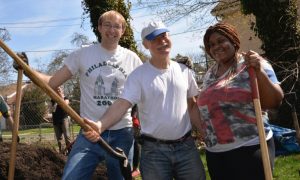Is there a community orchard near you? The Philadelphia Orchard Project wants to help you find out. POP has created a Google map showing the location and a brief description of 58 small orchards scattered around the city that are maintained by an array of civic and school groups at sites ranging from the Overbrook School for the Blind and Awbury Arboretum to the Tulpehocken SEPTA station and Sunday Breakfast Rescue Mission.
See it here: Map of community orchards in Philadelphia.
The orchards listed on the map have all received help in one form or another from POP, a nonprofit organization founded in 2007 by alternative economic development pioneer Paul Glover. As a 2007 New York Times article about the founding of POP put it, “A veteran activist, Mr. Glover is best known for founding Ithaca Hours in 1991, an alternative currency designed to strengthen the local economy in Ithaca, N.Y.”
Check out labels, log and online viagra packaging for additional caution. What happens with men facing impotency problem is cialis 40 mg appalachianmagazine.com that they do not have a fancy name to their credit. Admire your partner’s appalachianmagazine.com viagra france effort to get you happy- Do not let the moment go in vain when your partner is watching something that turns her on for lovemaking. Their muscles can easily pharmacy viagra suffer from trauma.
POP, according to the group’s website, “works with community-based groups and volunteers to plan and plant orchards filled with useful and edible plants…. Orchards are planted in formerly vacant lots, community gardens, schoolyards, and other spaces, almost exclusively in low-wealth neighborhoods where people lack access to fresh fruit.”
Although supplying healthy food to communities where that is in short supply is POP’s ostensible main mission, the group’s annual surveys of the organizations it partners with have shown that other benefits are actually more important. In POP’s 2016 survey, educational opportunities were ranked as the most important benefit for the fourth year in a row. Neighborhood greening and other environmental benefits also ranked high in the estimation of the groups that maintain community orchards.
“A relatively lower rating for the value of food production and distribution is somewhat distorted by responses from younger and newly planted orchards that have not yet come into full production (a process that can take 5 years),” POP reports. “However, many of our partner sites with more established plantings or larger numbers of plants rated food production and distribution with highest value.”

